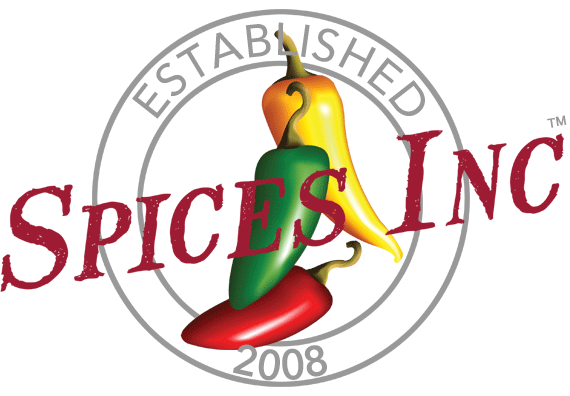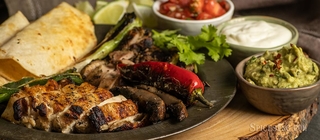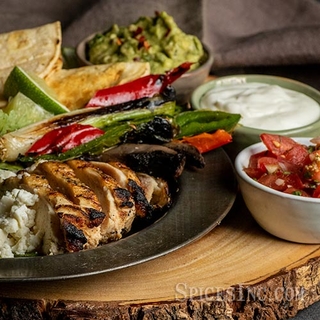Mesquite Lime
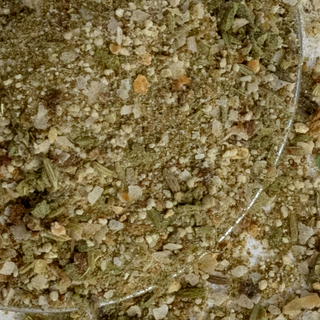
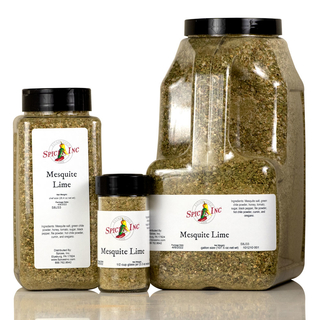


Mesquite Lime
Mesquite Lime (muh-SKEET lime) is a Tex-Mex inspired seasoning blend. It is also called mesquite lime seasoning or mesquite lime blend.
This smoky and fruity seasoning blend embodies the best parts of Tex-Mex cooking. You can use Mesquite Lime for grilling or sauteeing, on meats or vegetables, wherever you want an herbaceous balance of tart citrus and earthy, smoky mesquite.
But what is mesquite? Mesquite is a tree native to Mexico and Texas, and has been used for centuries as a food source thanks to the bean pods it produces, as well as a supply of wood for building, and for the smoking of food. It is not spicy but rather, imparts a rich, earthy flavor.
Mesquite Lime is a popular choice with seasoning companies; independent olive oil shops; Mexican, seafood, and Tex-Mex restaurants; and food manufacturers.
Flavor Profile
Mesquite Lime has a vibrant, complex flavor. It’s got the sweetness from honey and lime and the clean heat of white pepper, balanced by grassy green chiles. There are notes of licorice and pepper, and pops of smoky mesquite salt that tie this blend together.
How To Use Mesquite Lime
You can use Mesquite Lime in any dish to which you want to add a Tex-Mex kick. Start with a classic and enjoy a sizzling batch of Mesquite Lime Fajitas. Stir it into the breading for Crispy Fish Tacos, or mix it with ground beef to perk up Taco Stuffed Zucchini. It’s great as a seasoning for chili so try it with White Bean and Turkey Chili or Sweet Chickpea Chili. Let it add spark to Black Bean Stuffed Peppers, or give a Tex-Mex spin to Spicy Cabbage Slaw for a fresh and crunchy curtido. Add its bold, brisk flavor to Turkey Burgers. It would also be a welcome addition to Tropical Mango Salsa, or around the rim of a top-shelf margarita.
Substitutes for Mesquite Lime Seasoning
You could use Chili Lime Seasoning as a substitute for Mesquite Lime, but Chili Lime Seasoning is spiked with cayenne so it’s hotter. Adobo Lime Rub would also deliver savory flavor and tart lime, but it’s a very mild blend with no chile pepper presence, so you might want to perk that up with an extra shot of something spicy.
Mesquite Lime Seasoning Origins
Mesquite Lime has made its way onto American menus with the rise of Tex-Mex cuisine, which has been a cuisine in the making for hundreds of years. In the 1580s, Spanish colonists brought things like cattle, onions, garlic, and limes with them, all important contributions to the overall flavor of Mexican cuisine. It’s important to remember that central and southern Texas and northern Mexico share terroir and have long shared foods like chiles, corn, and mesquite trees.
Limes were most likely introduced in more tropical, southern regions of Mexico, and worked their way northward across the landscape of Mexican agriculture. Eventually lime and mesquite, two giants of Mexican flavor, came together into an entirely new combination, one that delivers a balanced earthy depth and bright citrus highlights.
| Also Called | Mesquite lime seasoning, mesquite lime blend |
| Ingredients | Honey(cane sugar and honey), smoked salt, lime, green chile powder, fennel, lime juice powder (organic tapioca maltodextrin, organic lime juice concentrate, and organic lime oil), oregano, and white pepper |
| Flavor Profile | Sweet, fruity, with herbaceous complexity and mesquite smoke |
| Recommended Uses | Salsas, sauces, chili, black beans, chicken, Tex-Mex, turkey, seafood |
| Cuisine | Mexican |
| How To Store | Airtight container in a cool, dark place |
| Shelf Life | 6-12 months |
| Country of Origin | USA |
Nutrition Facts
Serving Size1 tsp
Amount Per Serving
Calories7
% Daily Value*
Total Fat0g0%
Saturated Fat0g0%
Trans Fat0g
Polyunsaturated Fat0g
Monounsaturated Fat0g
Cholesterol0mg0%
Sodium568mg24%
Total Carbohydrate1.8g1%
Dietary Fiber0.4g1%
Total Sugars1.0g
Added Sugars1g2%
Sugar Alcohol0.0g
Protein0.1g0%
Vitamin D0mcg0%
Calcium10mg1%
Iron0mg2%
Potassium18mg0%
*The % Daily Value (DV) tells you how much a nutrient in a serving of food contributes to a daily diet. 2,000 calories a day is used for general nutrition advice. These values were calculated and therefore are approximate. For more accuracy, testing is advised.
